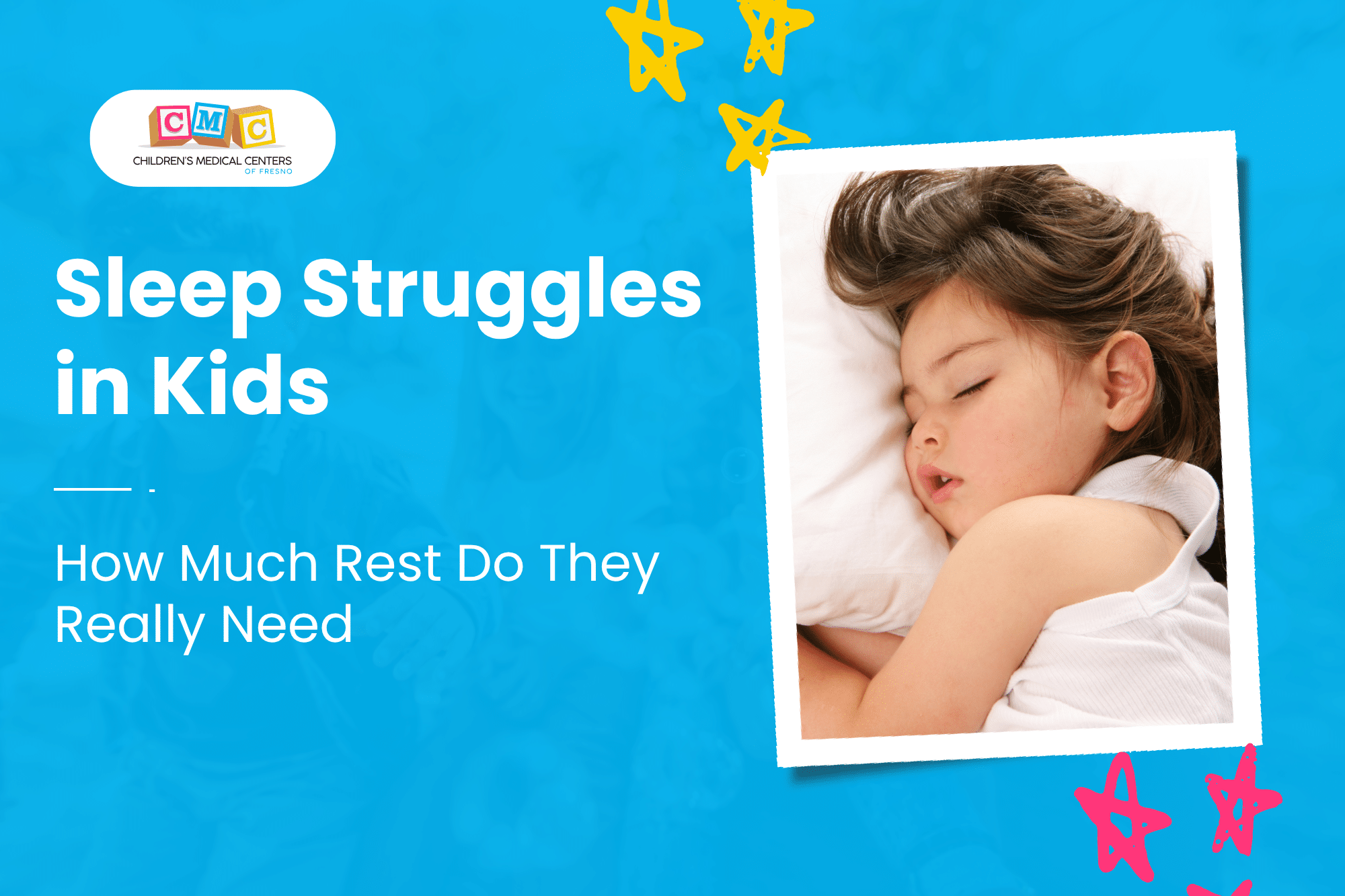Sleep struggles in kids are all too familiar for many families. Maybe your child insists on “just one more story,” or your teen swears they’re not tired—even though their eyes are half-closed. And the next morning? You’re both feeling sluggish, wondering if anyone actually got the rest they needed.
Sleep isn’t just about avoiding cranky mornings. It plays a powerful role in your child’s growth, learning, and overall well-being. From helping young brains absorb new information to strengthening the immune system, quality sleep is just as essential as healthy nutrition and regular physical activity.
Yet for many parents, managing sleep struggles in kids can feel overwhelming. Bedtime resistance, irregular sleep schedules, and screen-time distractions often stand in the way of restful nights.
In this blog, we’ll explore how much sleep children really need at different ages, why healthy sleep hours matter so much, common bedtime challenges families face, and practical, pediatrician-approved tips from CMCFresno to help your child enjoy calmer evenings and more restorative sleep.
Turn Bedtime Battles Into Bedtime Wins
Why Sleep Matters for Kids
Sleep is more than just downtime. It’s essential for your child’s growth and well-being. A good night’s rest helps their bodies and minds recharge, setting them up for healthier, happier days.
Here’s why sleep matters so much:
While kids sleep, their bodies release growth hormones that help them grow taller and stronger. Sleep also gives their immune systems the boost they need to fight off germs and maintain steady energy levels.
Sleep is like the brain’s “save” button. It helps kids store memories, sharpen problem-solving skills, and stay focused in school. Without enough rest, learning and performance take a hit.
Have you ever noticed how kids are more likely to have meltdowns when they’re tired? That’s because sleep helps regulate mood and emotions. Well-rested kids are calmer, happier, and better able to handle daily stress.
And here’s something eye-opening: research shows that although most children (44.1%) slept 8–9 hours per night, nearly a third (32.4%) struggled with bedtime resistance, and about 29.4% had trouble falling asleep. That means even when kids spend time in bed, they might not be getting the quality rest their bodies and minds really need.
How Much Sleep Kids Really Need
Ever wonder if your child is sleeping enough? Between late-night homework, busy schedules, and bedtime battles, it’s not always easy to tell. Understanding the sleep needed by age can give you a clearer picture of whether your child is truly getting the rest they need.
|
Age Group |
Recommended Hours of Sleep |
|
Infant (4–12 months) |
12–16 hours (including naps) |
|
Toddlers (1–2 years) |
11–14 hours |
|
Preschoolers (3–5 years) |
10–13 hours |
|
School-age children (6–12 years) |
9–12 hours |
|
Teens (13–18 years) |
8–10 hours |
A few things to keep in mind:
- Younger kids still benefit from naps, which count toward their total sleep.
- Every child is unique; some may need a little more or a little less rest to feel their best.
- Consistently falling short of these ranges can affect mood, learning, and overall health.
Knowing these benchmarks can help you spot if your child is getting the rest they need or if sleep struggles might be holding them back.
Common Sleep Struggles in Kids
Many children fall short of the recommended sleep hours despite good routines. Sleep problems such as bedtime resistance, restless nights, or too much screen time are surprisingly common.
Here are some of the most frequent issues parents face:
- Bedtime resistance: Kids often become expert negotiators at night, asking for “just one more story,” water, or bathroom trips to delay sleep.
- Night wakings or nightmares: Some children wake up frequently or struggle with bad dreams, making it hard to stay asleep through the night.
- Trouble winding down: Screens, video games, and even too much excitement before bed can make it tough for kids to settle.
- Anxiety or fear of the dark: Worries or nighttime fears can keep kids awake long after lights out.
- Teen sleep struggles: Between homework, social life, and endless scrolling, teens often stay up late and don’t get the rest they need.
Signs Your Child Isn’t Getting Enough Sleep
If bedtime battles and restless nights sound familiar, you might be wondering how to tell if your child is truly missing out on sleep. The signs can sometimes be subtle, but they often show up in your child’s behavior and energy levels during the day, indicating disruptions in their natural sleep cycle.
Here are a few red flags to watch for:
- Morning crankiness or irritability: If your child starts the day in a bad mood, a lack of sleep may be the culprit.
- Difficulty focusing in school: Tired kids have a harder time paying attention, remembering lessons, and completing tasks.
- Hyperactivity: Some children become extra restless or fidgety when overtired, which can even be mistaken for ADHD.
- Falling asleep in the car or during quiet times: A well-rested child should be able to stay awake through short rides or calm activities.
- Trouble waking up in the morning: Constantly dragging themselves out of bed or needing multiple wake-up calls can signal too little sleep.
Tips to Help Kids Get Better Sleep
If you’ve noticed some of those signs in your child, don’t worry—small, consistent changes can make bedtime much smoother. Here are some practical sleep tips to help your child rest easier and feel more refreshed:
- Keep a consistent routine: Bath, story, and lights out help signal your child that it’s time to rest.
- Turn off screens early: Shut down devices at least an hour before bed.
- Make the room sleep-friendly: Dark, quiet, and cool spaces help kids settle faster.
- Stick to a schedule: Sleep train them by following the same bedtime and wake-up time every day, even on weekends.
- Encourage active days: Play and exercise burn energy, but avoid it right before bed.
- For teens: Limit caffeine, late-night studying, and social media scrolling.
Every child is different, so it may take some trial and error to figure out which strategies work best for your family. The key is consistency. Over time, these healthy habits help turn bedtime from a nightly battle into a calmer, smoother process.
When to Seek Professional Help
Sometimes, even with the best routines and consistency, sleep struggles can stick around. When that happens, it may be time to look a little deeper and get professional guidance.
Here are a few signs that it’s worth reaching out to your child’s pediatrician:
- Persistent problems: If healthy habits don’t seem to improve bedtime battles or night wakings.
- Possible sleep disorders: Loud snoring, sleep apnea, or restless sleep could point to something more serious.
- Ongoing fatigue: Struggling to stay awake, focus in school, or manage behavior may mean your child isn’t getting restorative rest.
If you’re seeing any of these patterns, don’t wait it out.
Building Healthy Sleep Habits for Healthy Kids with CMCFresno

Helping your child get the rest they need is one of the most powerful ways you can support their growth, learning, and happiness. Healthy sleep routines set the stage for calmer mornings, better focus in school, and a more balanced mood at home.
If you’ve tried building healthy sleep habits but still notice your child struggling, you don’t have to face it alone. At CMCFresno, our pediatric experts are here to guide you with compassionate care and practical solutions tailored to your child’s needs. Schedule a visit today and take the next step toward peaceful nights and brighter tomorrows.
Make Bedtime Smoother and Mornings Brighter
Sleep Struggles FAQs
Absolutely. Sugary snacks, caffeine (yes, even the kind hidden in chocolate), and lack of physical activity can disrupt healthy sleep. Light exercise during the day helps kids wind down at night.
Occasional light snoring can be normal. But loud, frequent snoring—especially with pauses, gasps, or restless sleep—could signal sleep apnea and should be checked by a doctor.
For some kids, yes! White noise, soft music, or calming sounds can mask disruptive noises and signal bedtime, but consistency matters more than the tool itself.
Children often fight fatigue by becoming more active, which can look like hyperactivity. It’s their body’s way of pushing through exhaustion.




